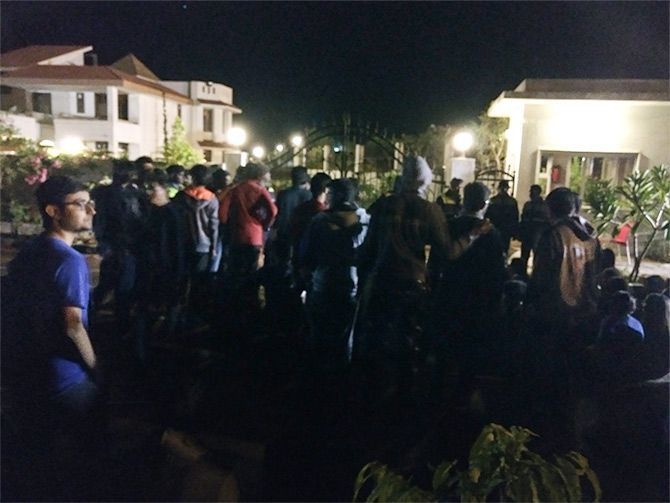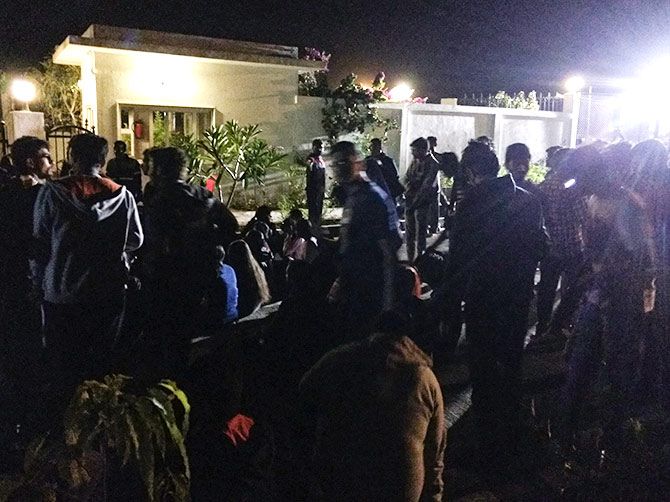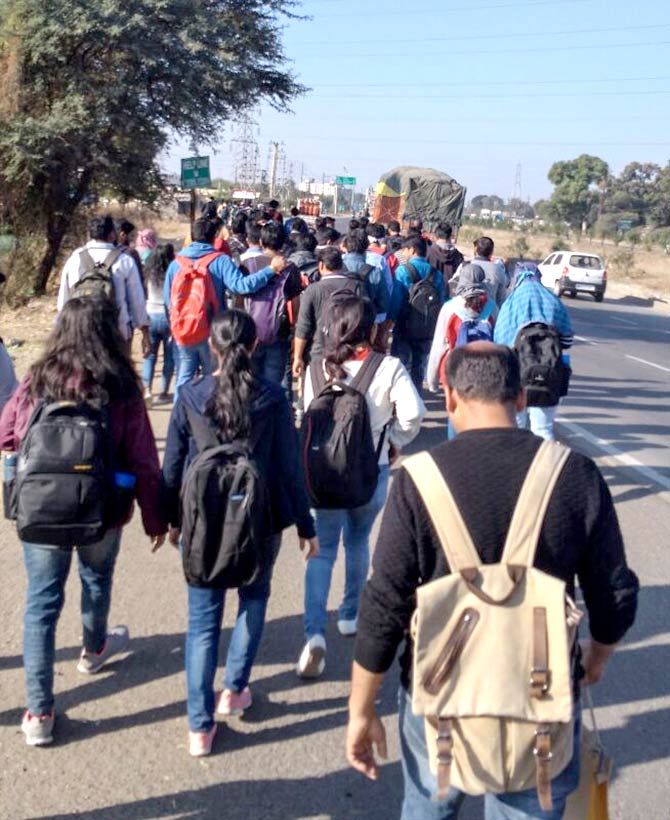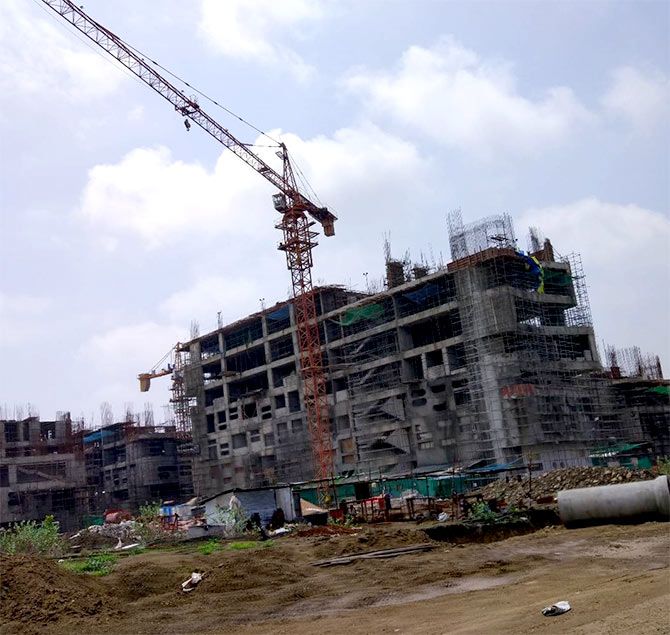'This is a public institution, run on public money and our fees,' the students say.
'Yet, decisions that affect us crucially are being taken without consulting us.'
Jyoti Punwani reports.

IMAGE: Indian Institute of Technology Indore students gather outside IITI Director Pradeep Mathur's bungalow to draw his attention to their grievances.
Indore to Muzaffarpur is 1,400 kms. It takes 39 hours by bus, 25 hours by train and six hours by plane and car to travel that distance.
Last week, two IIT Indore faculty members spent that much time to go meet Mr and Mrs Singh, parents of Kumar Singh, the former general secretary of the IIT Indore (IITI) students gymkhana committee.
No calamity had befallen the student to warrant such a long journey. It was undertaken only to tell the parents that their son was stirring up trouble in his institute.
Singh had already been removed from the post of general secretary. Apparently, this was not seen as enough.
Saying she had no knowledge about this trip by faculty members, Professor Nirmala Menon, media coordinator, IITI, told Rediff.com that the institute was functioning normally.
"Lectures are being held, exams are on," says Professor Menon.
Denying that there was any "unrest" at the institute, Professor Menon says there were some "internal issues" that were being "resolved with the students, who are also stakeholders".
But how could this resolution take place when the students' representative body, the gymkhana, had been dissolved?
"The gymkhana hasn't been dissolved," says Professor Menon. "I haven't seen any mail to that effect."
However, in the hour-long discussion that took place between the IITI director and students on the night of January 19, the audio recording of which is with this reporter, the director clearly says that the gymkhana has been dissolved, and refers to its members as 'your previous committee, your former representatives'.
The day after this discussion, students received an e-mail announcing that the gymkhana general secretary had been removed from his post.
Conversations with students (who wish to remain anonymous) reveal that things are far from normal. For the first time, most students stayed away from the Republic Day function.
A simple protest has had disproportionate and very swift repercussions, with not just students, but parents too being summoned to meet 'high-level committees'.

IMAGE: The quality of food served at the Indian Institute of Techonology Indore hostels provoked the students to protest.
The issue over which students erupted is a long-festering one -- food.
For the last two years, students have been protesting against their mess food, which they describe as unhygienic and over-priced.
A year ago, some of them even started an online petition addressed to the HRD ministry against the contractor who supplies them food, attaching photographs of insects in the food.
In December, a new canteen was brought into the campus on a trial basis, which proved popular with students. The sudden closure of this canteen sparked off demonstrations outside the director's bungalow on January 18 and 19.
The crackdown began almost immediately after the first demonstration.
Students allege they were asked to submit their ID cards as they returned to their hostel. An argument ensued, the general secretary was called. A few submitted their cards, most didn't.
The next day onwards, students started receiving mails to present themselves before a disciplinary committee.
About 12 students, the majority of them female, have received such mails. Parents of at least five students have also been summoned, while the general secretary's parents were honoured by a special visit.
But food is not the only issue troubling students.

IMAGE: PhD and post graduate students at the Indian Institute of Technology Indore walk 18 km to the institute to highlight the withdrawal of institute buses.
Two days before the demonstration, another protest took place -- this time, in a public place. Residents of Indore saw PhD students and post-doctorates walking from the city to the institute, 18 km away.
They were protesting the sudden reduction of institute buses, their only means of transport to the IITI.
Located about 18 km away from Indore on the Khandwa road, the IITI campus lies in a forested area, with scattered villages around. No public transport plies to the institute from the city.
Apart from the heavy truck traffic on this road at night, the area is not considered safe. In fact, an e-mail sent by the administration on January 11 alerts students about a 'biker gang' which steals mobiles from passersby.
Given the shortage of hostel rooms on campus, about 400 post-graduates -- those doing their PhD and post-doctoral students -- live in rented accommodation on the outskirts of Indore.
They travel to and from the institute in institute buses, free of charge, though two years ago, they had offered to pay for the buses.
PG students often need to work late, but the revised bus schedule sees the last bus leaving at 6.30 pm instead of the earlier 9 pm.
The spontaneous protest by students on both these vital issues of food and transport, have seen no resolution.
On the food front, students told Rediff.com that some of them have started cooking in their rooms, while those who can afford to, eat in dhabas outside, as the two available private outlets on campus are too expensive.
On the transport issue, PG students have been forced to make their own arrangements with private operators. The administration has made it clear, they said, that providing transport to them is not the institute's responsibility.
The crackdown has left students both scared and tired. The influential Akhil Bharatiya Vidyarthi Parishad is ready to help them; ABVP cadres turned up at the institute gates on January 20. But students are firm about not wanting political party interference.
What they want is an initiative from the government, since the administration refuses to respond.
Incidentally, Director Pradeep Mathur seems to be the final authority for the institute. He is also the head of the senate as well as the board of governors. Some students have therefore posted complaints directly on the PMO grievance portal.
"This is a public institution, run on public money and our fees," the students say. "Yet, decisions that affect us crucially are being taken without consulting us."
Currently, an IITI undergraduate pays Rs 113,550 per semester, while a PhD student pays Rs 41,600 -- not small amounts by any standards.

IMAGE: The half-comlete building at the Indian Institute of Technology Indore.
IITs are seen as the country's most prestigious institutes. But just one shocking reality on the IITI campus is enough to belie this claim.
A half-complete building, under construction for the last three years, is where most of their engineering classes and labs are held. Students must spend the better part of their day in this building, surrounded by noise, dust, and slush.
IIT Indore has seen protests in the past, which were resolved through the students' gymkhana. But now, in the absence of any representative body to communicate with the institute, students have taken to Twitter, creating the hashtag #saveiitindore.
A tweet on January 28 by a PhD student addressed to HRD Minister Prakash Jawdekar points to yet another potential flashpoint: The proposal that PhD students must submit four peer-reviewed papers in four years.
This requirement says the tweet, may well lead to another Rohith Vemula.










